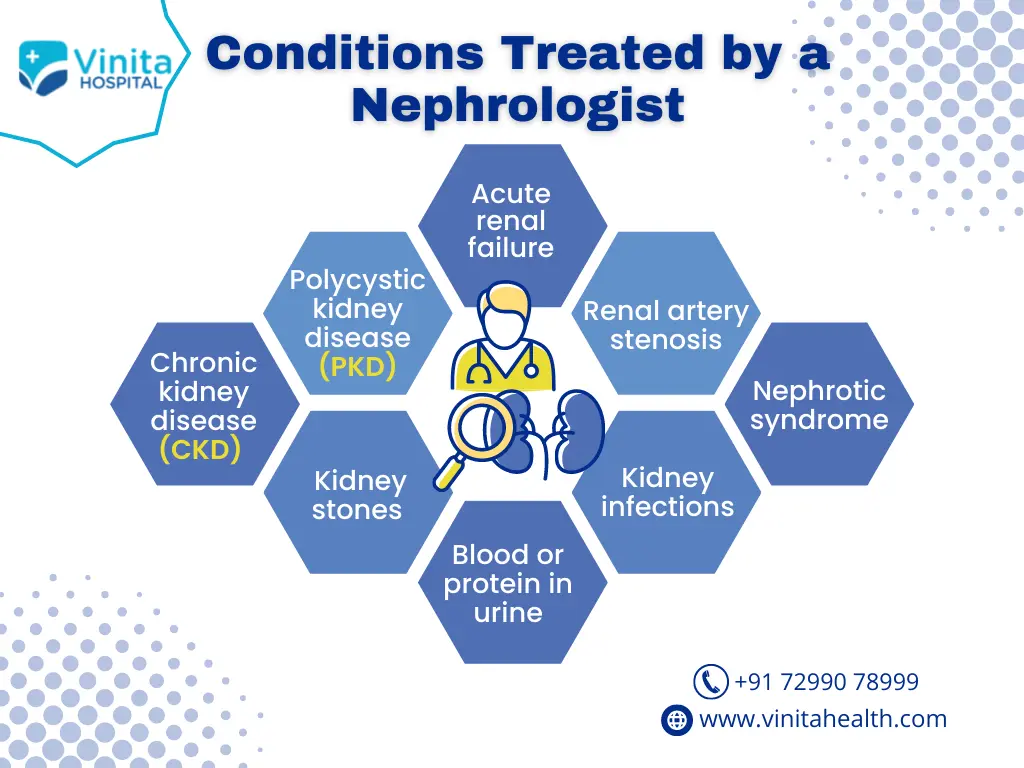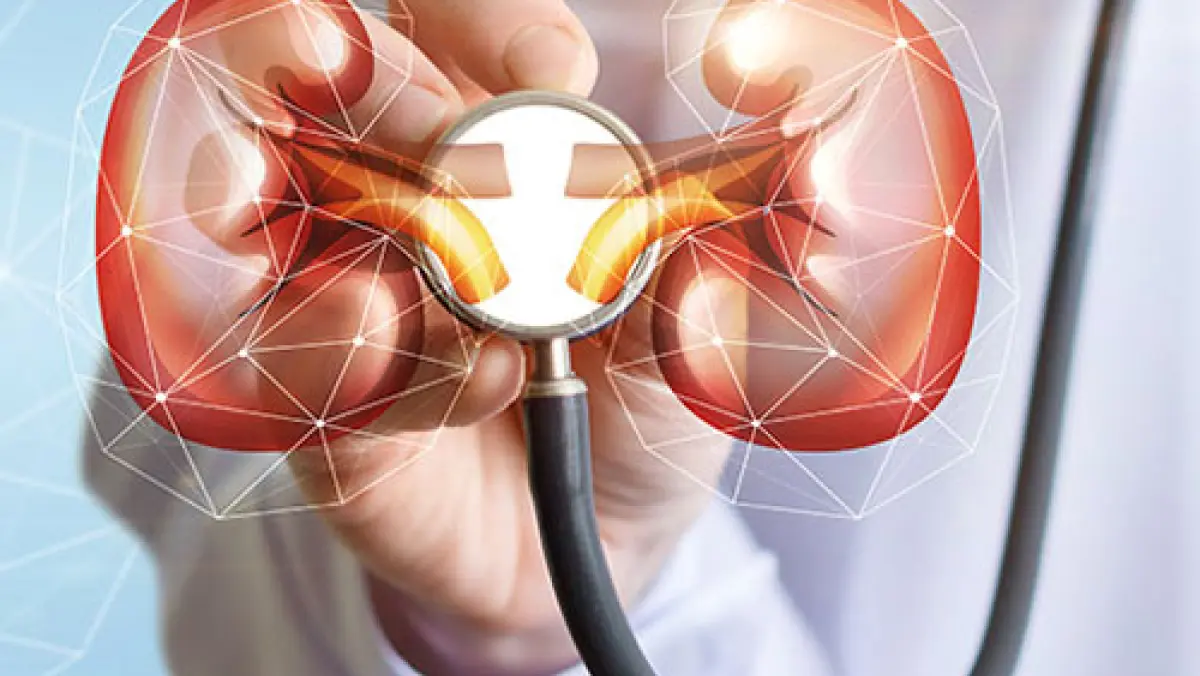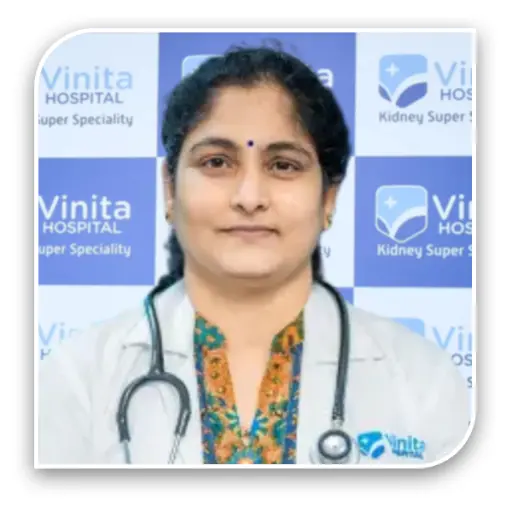Nephrology is the branch under the subspecialties of internal medicine that deals with the diagnosis and treatment of renal or kidney-related diseases. A human body comprises two kidneys – bean-shaped organs that are located on either side in the retroperitoneal space. This vital organ is responsible for cleaning waste products and excess fluid from the body.
Vinita Hospital offers comprehensive care to patients suffering from a spectrum of acute and chronic kidney diseases. We are the best nephrology hospital in Chennai renowned for using cutting-edge facilities and treatment options. The experts in this department consistently invest their time, effort, and expertise to help people ensure a healthy kidney through various non-invasive procedures.
Our experienced nephrologist in Chennai is acclaimed for the rare clinical skills to provide top-notch treatment to people of all classes ranging from children to adults. We have a team of professionals including kidney transplant specialists, urologists, nephrologists, and other nursing staff to handle all our patients with utmost care.
Our Doctors
What is Nephrology?
Nephrology is a branch of medicine that deals with the study, diagnosis, and treatment of conditions and diseases that affect the kidneys. Nephrologists are medical specialists who have expertise in the diagnosis and management of kidney-related disorders, including acute and chronic kidney disease, glomerular disease, electrolyte imbalances, hypertension, and kidney stones.
Some common conditions that nephrologists treat at the nephrology hospital in Chennai include:
- Acute kidney injury
- Chronic kidney disease
- Glomerulonephritis
- Nephrotic syndrome
- Polycystic kidney disease
- Diabetic nephropathy
- Hypertension-related kidney disease
- Kidney stones
- Urinary tract infections
Top Nephrology Hospitals in Chennai
When seeking the best nephrology care, it’s essential to choose a hospital renowned for its expertise, advanced treatments, and patient-centric approach. Here are some of the top nephrology hospitals in Chennai that excel in providing comprehensive kidney care.
Vinita Hospital
Vinita Hospital is one of the leading healthcare providers in Chennai, known for its state-of-the-art nephrology department. The hospital offers a range of services, including dialysis, kidney transplantation, and treatment for chronic kidney diseases. With a team of highly skilled nephrologists and advanced medical technology, Vinita Hospital ensures that patients receive the best possible care.
Key Points:
- Specialized in kidney transplantation and dialysis.
- Experienced team of nephrologists.
- Advanced diagnostic and treatment facilities.
Causes of Nephrological Conditions
The causes of nephrological conditions include:
- Diabetes: High blood sugar levels in diabetes can damage the small blood vessels in the kidneys, leading to kidney disease.
- High Blood Pressure: Hypertension or high blood pressure can damage the blood vessels in the kidneys, leading to kidney disease.
- Infections: Infections such as urinary tract infections (UTIs) can cause kidney infections, leading to kidney damage.
- Glomerulonephritis: Glomerulonephritis is a type of kidney disease that is caused by inflammation of the glomeruli, which are tiny structures in the kidneys that filter waste and excess fluid from the blood.
- Polycystic Kidney Disease: Polycystic kidney disease is a genetic disorder that causes cysts to form in the kidneys, leading to kidney damage over time.
- Kidney Stones: Kidney stones are hard deposits that form in the kidneys and can cause pain and damage to the kidneys.
- Medications: Some medications, such as certain antibiotics and painkillers, can cause kidney damage over time.
- Autoimmune Disorders: Autoimmune disorders such as lupus can cause inflammation and damage to the kidneys.
- Congenital Abnormalities: Congenital abnormalities or birth defects in the kidneys or urinary tract can cause kidney problems.
- Aging: As we age, the kidneys may not function as well, leading to kidney disease.

Symptoms of Nephrological Conditions
Symptoms of nephrological conditions can vary depending on the specific condition affecting the kidneys. However, there are some common symptoms that may indicate kidney-related problems. Some of these symptoms include:
- Changes in Urination: Changes in urination patterns such as increased frequency, decreased urine output, or difficulty urinating can be a sign of kidney problems.
- Blood in the Urine: Hematuria or blood in the urine can be a sign of kidney disease or other urinary tract problems.
- Swelling: Swelling in the legs, feet, ankles, or around the eyes can be a sign of kidney damage or failure.
- Fatigue: Feeling tired or fatigued even with adequate rest can be a sign of kidney disease or other underlying health conditions.
- High Blood Pressure: Hypertension or high blood pressure is a common sign of kidney disease or kidney damage.
- Loss of Appetite and Nausea: A loss of appetite, nausea, and vomiting can be signs of advanced kidney disease.
- Skin Rash or Itching: Skin rash, itching, or dry skin can be a sign of advanced kidney disease or uremia.
If you experience any of the symptoms mentioned above, it is important to consult with a nephrologist at the nephrology hospital in Chennai for further evaluation and treatment.
What is Interventional Nephrology?
Interventional nephrology is a subspecialty within the field of nephrology that focuses on the use of minimally invasive procedures to diagnose and treat kidney-related conditions. Interventional nephrologists use specialized techniques and tools to access the blood vessels and organs of the urinary tract, allowing them to perform diagnostic tests and therapeutic procedures without the need for open surgery.
The field of interventional nephrology in the nephrology hospital in Chennai has grown significantly in recent years, as advances in technology and techniques have made it possible to treat a wide range of kidney-related conditions using minimally invasive procedures.
Some of the most common interventions performed by interventional nephrologists include the placement and maintenance of hemodialysis access devices, such as arteriovenous fistulas and grafts, as well as the management of complications associated with these devices.
Interventional nephrologists may also perform other procedures, such as kidney biopsy, stent placement, and nephrostomy, to diagnose and treat a variety of kidney-related conditions, including kidney stones, renal artery stenosis, and renal cysts.
What is Transplant Nephrology?
Transplant nephrology is a subspecialty within the field of nephrology that focuses on the medical care of patients who have undergone kidney transplantation. A kidney transplant is a surgical procedure in which a healthy kidney from a donor is transplanted into a patient with end-stage renal disease, allowing the patient to regain some or all of their kidney function. Transplant nephrologists work alongside transplant surgeons and other healthcare professionals to manage the care of kidney transplant recipients, both before and after the transplant surgery.
The role of a transplant nephrologist includes assessing potential transplant recipients for suitability for a transplant, monitoring their condition before and after the procedure, and managing immunosuppressive medications to prevent organ rejection. Additionally, transplant nephrologists at the nephrology hospital in Chennai are involved in the care of patients who experience complications following transplantation, such as infections or rejection episodes, and work to adjust medication regimens or other treatments as needed.
Diseases Treated Under the Department of Nephrology in Chennai
Nephrology in Chennai focuses on ensuring the normal functioning of kidneys by treating a variety of conditions that include:
- Urine abnormalities such as excess excretion of sugar, blood, protein, casts, and crystals.
- Cancers of the bladder, kidneys, and urethra.
- Glomerular complications affect the tiny filtering systems of the kidneys.
- Acute, long-term, sudden, or chronic renal failure.
- Infections in the kidneys.
- Effects of diseases like hypertension and diabetes.
- Acid-base fluctuations.
- Bladder and kidney stones.
- Nephritis and nephrotic syndrome.
- Hydronephrosis.
- Renal vascular diseases disturb the blood vessel networks within the kidneys.
- Tubulointerstitial diseases affect the kidney’s tubules.
- Autoimmune diseases including autoimmune vasculitis and lupus.
- Dialysis and its associated long-term complications.
- Renal Transplantations.
- Polycystic kidney diseases may be congenital, genetic, or inherited.
- Anaemia and bone disease related to kidney disease.
All these diseases require comprehensive treatment by the nephrologist in Chennai at the initial stage itself else it would worsen the disease.
Additional Conditions of Nephrology Hospital in Chennai
The other conditions that are treated by the best nephrology hospital in Chennai have to be specialized in offering evaluation for a broad range of kidney-related complications including:
- Amyloidosis: This disease is characterized by amyloids or the abnormal growth of protein in different parts of the body.
- Electrolyte Disorders: This condition has to be treated by the best nephrology hospital in Chennai because it can lead to an abnormal imbalance of minerals in the body resulting in potentially harmful damage to organs like the brain and muscles.
- Diabetic Kidney Disorder: The long-standing complications of diabetes also contribute to kidney diseases and can be one of the prominent causes of kidney failure.
- Glomerulonephritis: This kind of disease has to be treated by a nephrologist in Chennai because it can develop due to inflammation in tiny kidney organs called glomeruli.
- Hypertension (Chronic Hypertension): It refers to a consistent increase in blood pressure levels. This condition affects different body organs resulting in illnesses and involves heart failure, aneurysm, stroke, and kidney failure.
- Lupus Nephritis: This is a condition in which inflammation occurs in the kidneys due to systemic lupus erythematosus (SLE) which is an autoimmune disease.
- Kidney Failure: Also known as renal failure, this medical condition needs to be treated at the best nephrology hospital in Chennai because it makes the kidneys incapable of filtering out waste products from the blood.
- Kidney Disease: Kidney diseases cause a lot of damage to the organ resulting in its system failure. These complications make kidneys inefficient in ejecting waste and excess fluid from the body.
- Nephrotic Syndrome: This kidney disorder occurs due to damage to the kidney’s small blood cells. This syndrome leads to the excretion of excessive protein in your urine.
- Pyelonephritis: This bacterial infection leads to inflammation of substances in the kidney.
- Polycystic Kidney Disorder: This genetic disorder requires immediate treatment from the best nephrology hospital in Chennai because it can develop clusters of cysts within the kidneys and result in high blood pressure or kidney failure.
- Renal Insufficiency: This medical condition reduces blood flow to the kidneys significantly due to renal artery diseases leading to poor functioning of the kidneys.
Signs and Symptoms of Kidney Diseases
Some common signs and symptoms that indicate the risk of severe renal complications include:
- Frequent swelling in the ankles, legs, or feet.
- Severe headaches.
- Dry or itchiness in the skin.
- Nausea and vomiting.
- Loss of appetite.
- Trouble concentrating.
- Unexplained memory problems, confusion, or trouble focusing.
- Pain or stiffness in the joints.
- Unexplained blood pressure.
- Abnormal weight loss.
- Muscle cramps, weakness, or numbness.
- Exhaustion and trouble sleeping.
- Blood in the urine (haematuria).
- Reduced urine output but not related to dehydration.
Diagnosis and Treatment Options for Nephrology Diseases
Diagnosis
There are several medical procedures under the Department of Nephrology in Chennai for diagnosing, monitoring, and treating kidney diseases. Some of the common ones are:
- Ultrasound
- CT scan
- Biopsy
- Haemodialysis
- Kidney transplant
Treatment Procedures
The state-of-the-art dialysis unit with the latest equipment and facilities for nephrology treatment at Vinita Hospital, the best nephrology hospital in Chennai operates 24/7 at full capacity. It deals with various kinds of services at the Department of Nephrology in Chennai including:
Peritoneal Dialysis (CPD)
During peritoneal dialysis, a fluid called dialysate is injected into the peritoneal or abdominal cavity using a catheter. The nephrologist from the best nephrologist hospital in Chennai will allow the dialysate to sit there for several hours while waste products are removed from the capillaries into the liquid. The dialysate will then be drained out.
Liver Dialysis (MARS Therapy)
The MARS (Molecular Adsorbent Recirculating System) therapy is based on the concept of albumin dialysis which is quite effective in eliminating protein-bound and water-soluble toxins. The treatment procedure facilitates liver regeneration and stabilization of the function of the vital organs.
Continuous Renal Replacement Therapy (CRRT)
Patients who are critically ill are prone to have a high metabolic rate as their bodies try to recover from the disease. They need vasoactive drugs for continuous waste elimination and simultaneously receive large volumes of fluid in the form of nutritional, drug infusions, and inotropic agents.
Therefore, CRRT (continuous renal replacement therapy) is followed at the best nephrology hospital in Chennai to help the patient remove wastes and water gently without causing hypotension. It is also a slow form of hemodialysis, where the blood is taken out and pumped through a hemofilter.

Kidney Transplant
Patients with kidney failure have to undergo dialysis or kidney transplantation. It requires frequent visits to the best nephrology hospital in Chennai for treatments. But with a liver transplant, there is no chance to depend on a dialysis machine and the patient can also lead a better quality of life.
Combined Liver & Kidney Transplant and Kidney Biopsy
Combined liver and kidney transplantation are usually done in patients with cirrhosis and other associated kidney diseases. During a kidney biopsy, the nephrologist in Chennai will collect samples of the kidney for checking in great detail under special microscopes. It can be done either through an open biopsy or percutaneous biopsy.
Kidney Disorders
Kidney disorders can be challenging, and seeking specialized care is crucial for effective management. If you’re in Chennai, you’re in luck because there’s a leading nephrology hospital in Chennai dedicated to providing exceptional care for kidney-related issues.
Nephrology Hospital in Chennai: Expert Care for Kidney Disorders
At our Nephrology Hospital in Chennai, we understand the importance of your kidneys in maintaining overall health. Kidney disorders, if left untreated, can lead to severe complications. That’s why we offer a team of highly skilled nephrologists and cutting-edge medical technology to diagnose and treat a wide range of kidney conditions.
Comprehensive Kidney Care
Our nephrology hospital in Chennai specializes in diagnosing and managing various kidney disorders, including:
- Chronic Kidney Disease (CKD): Our experienced nephrologists develop personalized treatment plans to slow the progression of CKD and improve your quality of life.
- Acute Kidney Injury (AKI): We provide immediate care and support for individuals experiencing sudden kidney problems, ensuring a speedy recovery.
- Kidney Stones: Our experts use the latest techniques to diagnose and treat kidney stones, offering relief from pain and preventing recurrence.
- Hypertension-Associated Kidney Disease: Managing high blood pressure is crucial to preserving kidney function. Our specialists help control hypertension to protect your kidneys.
- Diabetic Nephropathy: Diabetes can take a toll on your kidneys. Our team offers comprehensive care to manage diabetic nephropathy and prevent complications.
Tests and Procedures
A nephrologist is a medical doctor who specializes in the diagnosis, treatment, and management of kidney diseases and disorders. Some of the tests and procedures that a nephrologist may use to evaluate and manage kidney problems include:
- Blood tests.
- Urine tests.
- Imaging tests.
- Biopsy.
- Dialysis.
- Kidney transplantation.
- Medications.
- Lifestyle modifications: In addition to medical treatments, nephrologists may recommend lifestyle modifications such as dietary changes, exercise, and quitting smoking to help manage kidney disease.
How Do You Become a Nephrologist?
Becoming a nephrologist necessitates numerous years of education and training. The process includes completing four years of college, followed by four years of medical school. After medical school, doctors must complete three years of residency, which is specialized training in the field of nephrology.
Additionally, a two to three-year fellowship in nephrology is required, and an additional year may be added for further training in transplant nephrology or interventional nephrology. Nephrologists in the United States must also pass a board certification exam in internal medicine and nephrology administered by either the American Board of Internal Medicine or the American Osteopathic Association to obtain licensing and certification.
Conclusion
The nephrology department in Vinita Hospital in Chennai has a dedicated team of nephrologists, physician assistants, dialysis technicians, dialysis assistants, dialysis nurses, and a transplant coordinator along with the standard dialysis unit and the latest technology to provide all types of dialysis for the well-being of the patient.
Read also Diabetology Hospital in Chennai.



